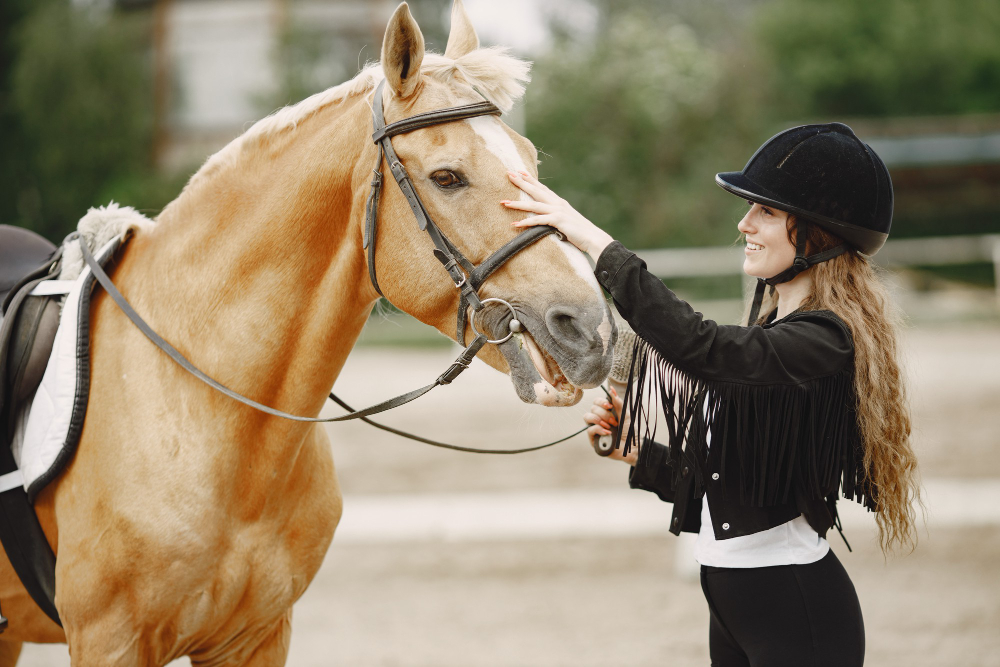A horse makes an excellent companion for contentment, companionship, riding, or competition. What’s your purpose for owning a horse?
Sharing your life’s journey with a horse can be a wonderful experience. However, it comes with many responsibilities. Your horse needs your love, warmth, and commitment. Did you know a horse can live beyond 35 years if you are committed to caring for a horse properly?
In this blog post, let’s delve deeper into horse health tips covering everything from basic care to grooming and feeding. Each suggestion will help ensure your horse stays happy, fit, and ready to be your best equine companion.
Understanding Common Horse Health Issues
To properly care for your horse, you must recognize the signs of common health issues and address them promptly. Here are some conditions to watch for:
- Arthritis or Degenerative Joint Disease: Inflammation of your horse's joints leading to painful stiffness.
- Gastric Stomach Ulcers: Signs include reduced appetite, change in attitude, decreased performance, and training reluctance.
- Colic: Painful abdominal condition, including restlessness, increased heart rate, and rolling.
- Laminitis: Painful foot condition in your horse following inflamed laminae.
- Back Issues: Muscle strains or pulled ligaments.
- Colds: Signs include nasal discharge, lethargy, swollen lymph nodes, and cough.
Key Tips for Monitoring Your Horse’s Well-Being:
Some essential horse health tips for monitoring your horse's well-being daily include:
- Understanding your horse's standard behavior patterns.
- Conducting regular health checks to spot illness signs quickly.
- Providing a nutritious diet, proper exercise, and adequate rest.
- Contact your vet immediately if you notice behavioral changes.
Benefits of Regular Exercise for Horses
Implementing an appropriate exercise regime is crucial for horse care when your horse is recovering from illness. The National Association of Veterinary Physiotherapists emphasizes that your horse needs a regular exercise routine to heal faster.
The exercise needed depends on your horse's type and health condition. Consult your veterinarian for specific horse health tips regarding exercise recommendations. They'll consider factors like age, condition, ability, and physical issues.
Horses living outdoors naturally move around while grazing and socializing with other horses. Beneficial exercise options include riding, turnout, lunging, hacking, and hydrotherapy.
Also Read: How to Keep Your Horse's Lungs Healthy: Practical Tips
Exercises to Strengthen Different Muscle Groups
Recovering muscular strength is vital to keep your horse healthy and active. Strength training exercises differ from regular routines and require special attention.
Research emphasizes the importance of strength training in building your horse's musculoskeletal system to prevent injuries. Collection work, hill interval training, and gymnastic training are excellent options. Always consult your veterinarian before implementing any strength training program.
Some good muscle-strengthening exercises for your horse are as follows:
1. Polework and Bounces
- Walk, trot, or canter over ground poles to engage hindquarters and topline.
- Use raised poles and cavaletti for increased leg lift.
- Set up bounce jumps to build pushing power in the hind legs.
2. Hill Work
- Uphill riding strengthens the hindquarters, back, and core.
- Downhill work builds front leg strength and balance.
3. Core Exercises
- Alternate raised poles for enhanced core stability.
- Canter poles for improved abdominal tone.
- Weaving exercises for lateral strength.
4. Backing Up
- Practice straight-line backing for abdominal strength.
- Start slowly to maintain proper form and balance.
5. Lateral Movements
- Use leg yielding to activate inner thigh muscles.
- Incorporate travers for topline development.
- Focus on balanced, controlled movements.
6. Interval Training
- Combine varied terrain with different gaits.
- Alternate between work and recovery periods.
- Progress gradually to build endurance.
7. Stretching Routine
- Tummy lifts for core engagement.
- Carrot stretches for neck flexibility.
- Gentle tail pulls for topline activation.
Introduce exercises gradually and monitor your horse's response to prevent strain or injury.
The Role of Rest and Recovery in Horse Fitness
Rest and recovery are essential components of horse fitness. Your horse is an elite athlete, and their well-being and performance should be primary concerns. After strength training, your horse's muscles undergo microscopic changes that trigger natural repair processes. Adequate rest allows the body to rebuild and strengthen muscle fibers effectively.
High-intensity training and competition can physically stress your horse. This essential horse health tip emphasizes the importance of rest periods to reduce muscular wear and tear.
Care for Your Horse Through Proper Hoof Maintenance
Daily hoof inspection and cleaning are crucial aspects of horse and care practices. Even when not riding, a small stone could cause significant damage to your horse’s hoof and internal structures.
Work with your farrier and veterinarian to establish an appropriate trimming and shoeing schedule.
Providing A Balanced Diet to Your Equine
Among the most important horse health tips is maintaining a balanced diet. Focus on preventing illness and delivering the necessary energy and nutrients. A nutritious diet includes:
- Pasture and hay.
- Grains and vitamins.
- Supplements tailored to your horse’s needs.
Consult your veterinarian to develop a feeding regime that meets your horse’s requirements.
Horse care supplements also provide essential nutrients that support overall well-being. Consult your veterinarian to determine the proper supplementation for your horse—brands like MedVetPharm offer specialized supplements for weight gain and joint health.
Also Read: Importance Of Hay In Your Horse's Diet
Takeaway
These comprehensive horse health tips cover essential aspects of equine care. From health monitoring to exercise, strength training, nutrition, and hoof care, we've provided a complete guide to care for your horse.
As a horse owner, understanding your horse's normal behavior helps you quickly detect concerning changes. Prioritize your horse's holistic well-being through balanced nutrition, regular exercise, and proper hoof care. Building a strong bond depends on understanding how your horse communicates and behaves.
Consider consulting your veterinarian about adding nutritional supplements to support your horse's overall health and vitality.
Trust MedVetPharm for Equine Horse Health Supplements
Med-Vet Pharmaceuticals specializes in premium horse supplements tailored to your horse's needs. Care for your horse's overall health with our gastric support and joint support supplements. MVP products are designed to maintain mobility, help boost immunity and promote overall well-being.
Explore our selection of diverse horse supplements. For guidance or assistance, call us at 833-809-4848 or contact us today!

